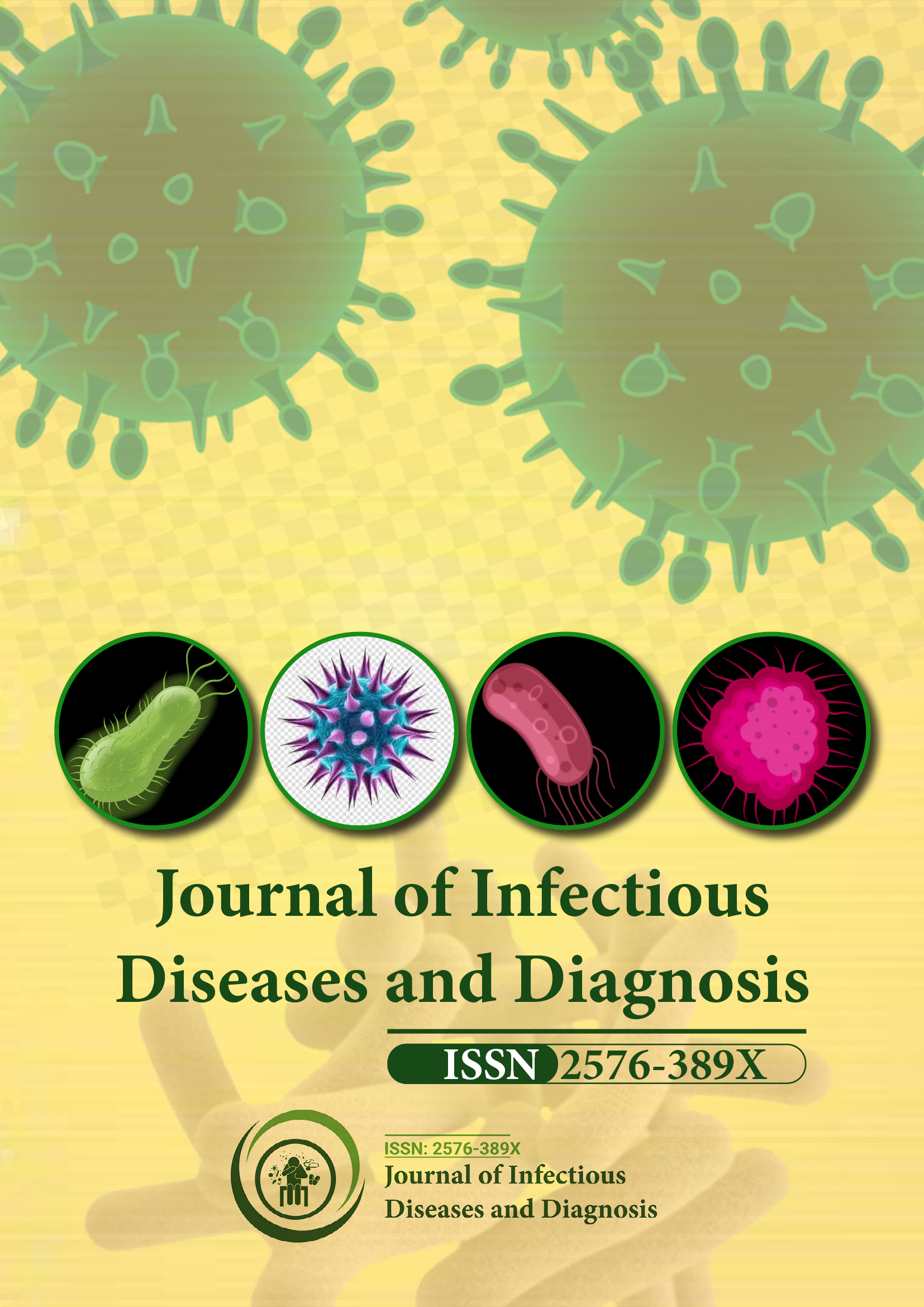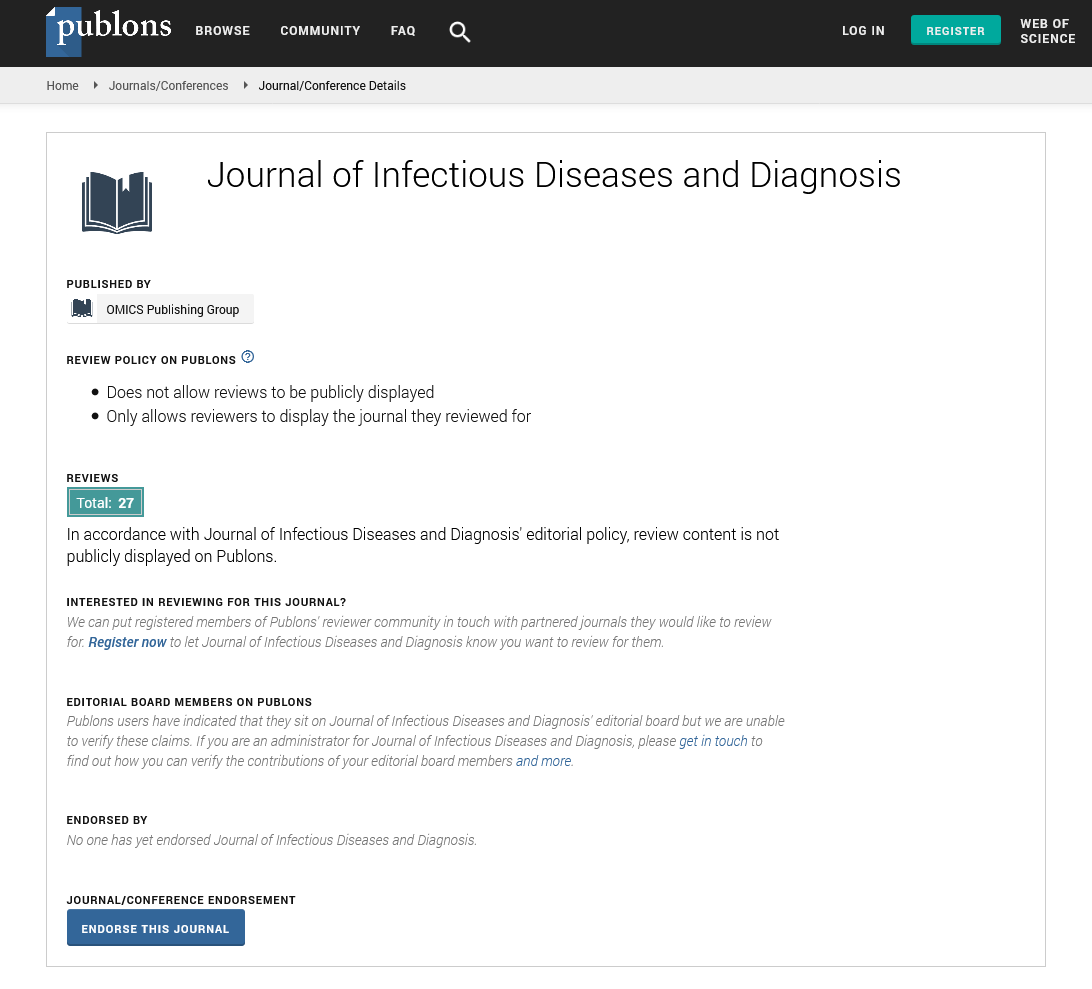Indexed In
- RefSeek
- Hamdard University
- EBSCO A-Z
- Publons
- Euro Pub
- Google Scholar
Useful Links
Share This Page
Journal Flyer

Open Access Journals
- Agri and Aquaculture
- Biochemistry
- Bioinformatics & Systems Biology
- Business & Management
- Chemistry
- Clinical Sciences
- Engineering
- Food & Nutrition
- General Science
- Genetics & Molecular Biology
- Immunology & Microbiology
- Medical Sciences
- Neuroscience & Psychology
- Nursing & Health Care
- Pharmaceutical Sciences
Commentary - (2023) Volume 8, Issue 1
Molding the Future of Therapeutic Approaches for Infectious Diseases in the Next Generation
Haifa Aldakhil*Received: 02-Jan-2023, Manuscript No. JIDD-23-20470; Editor assigned: 04-Jan-2023, Pre QC No. JIDD-23-20470 (PQ); Reviewed: 18-Jan-2023, QC No. JIDD-23-20470; Revised: 25-Jan-2023, Manuscript No. JIDD-23-20470 (R); Published: 01-Feb-2023, DOI: 10.35248/2576-389X.23.08.200
About the Study
Therapeutic strategies for infectious diseases have come a long way over the years, but there is still much work to be done to shape the future of next-generation therapies. The current COVID-19 pandemic has highlighted the urgent need for more effective treatments, vaccines and preventative measures. The next generation of therapeutic strategies for infectious diseases is a rapidly evolving field that is critical for addressing the ongoing threat of pandemics, as well as addressing the rise of antibioticresistant bacteria and the emergence of new and dangerous viruses. Here are some key areas that will play a significant role in shaping the future of infectious disease therapy:
Precision medicine
A personalized approach to treatment is crucial in the next generation of infectious disease therapies. Precision medicine takes into account individual differences in genetics, lifestyle, and environment to develop treatments that are tailored to the specific needs of each patient, improving efficacy and reducing side effects.
Combination therapies
The use of combination therapies, such as combining antibiotics and antivirals, has the potential to increase efficacy and reduce the development of drug resistance. This approach also allows for the treatment of multiple pathogens simultaneously, which is especially important in the case of polymicrobial infections.
Vaccines
Vaccines have proven to be a highly effective way to prevent the spread of infectious diseases, but there is still much work to be done to improve their efficacy. The development of nextgeneration vaccines, such as personalized vaccines, will play a significant role in shaping the future of infectious disease therapy.
Improved diagnostics
Accurate and rapid diagnostic tests are crucial for effective treatment of infectious diseases. The development of new diagnostic technologies, such as genomics, nanotechnology, and artificial intelligence, has the potential to revolutionize the field of infectious disease diagnostics and improve the speed and accuracy of diagnosis.
Antimicrobial peptides
Antimicrobial peptides are naturally occurring compounds that have been shown to be effective against a wide range of infectious pathogens. The development of next-generation antimicrobial peptides, such as those that can target specific pathogens and avoid the destruction of healthy cells, has the potential to provide a more effective and safer alternative to traditional antibiotics.
Gene editing
Gene editing technologies, such as Clustered Regularly Interspaced Short Palindromic Repeats and CRISPR-Associated Protein 9 (CRISPR/Cas9), have the potential to provide a new approach to treating infectious diseases. By modifying the genetic code of pathogens, gene editing can neutralize their ability to cause harm, providing a new and effective form of therapy.
Global collaboration
The global nature of infectious diseases requires a coordinated and collaborative response. Governments, organizations, and the scientific community must work together to develop and implement effective therapeutic strategies for infectious diseases. This requires investment in health systems, especially in low- and middle-income countries, to ensure that everyone has access to the treatments and vaccines they need.
Conclusion
In conclusion, the next generation of therapeutic strategies for infectious diseases will require a multi-disciplinary approach that takes into account individual differences, utilizes combination therapies, and prioritizes global collaboration and access to care. The development of precision medicine, improved diagnostics, and next-generation vaccines, as well as the use of gene editing and antimicrobial peptides, will play a critical role in shaping the future of infectious disease therapy. It is essential that investments are made in research and development to ensure that we are prepared for future outbreaks of infectious diseases and to address the ongoing threat of pandemics. The future of next-generation therapeutic strategies for infectious diseases requires a multi-disciplinary approach that takes into account individual differences, utilizes combination therapies, and prioritizes global collaboration and access to care. The current COVID-19 pandemic has demonstrated the importance of investment in research and development of new and innovative therapeutic strategies, and the need to be prepared for future outbreaks of infectious diseases.
Citation: Aldakhil H (2023) Molding the Future of Therapeutic Approaches for Infectious Diseases in the Next Generation. J Infect Dis Diagn. 8:200.
Copyright: © 2023 Aldakhil H. This is an open-access article distributed under the terms of the Creative Commons Attribution License, which permits unrestricted use, distribution, and reproduction in any medium, provided the original author and source are credited.

